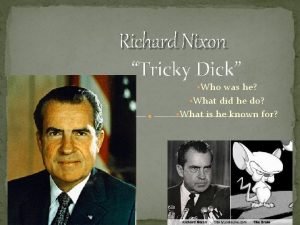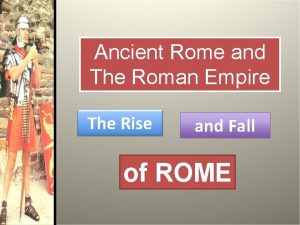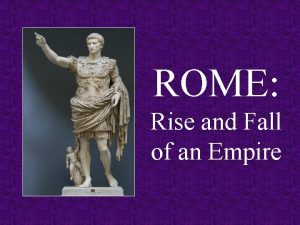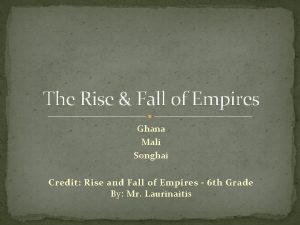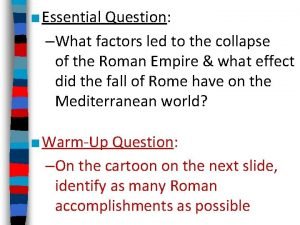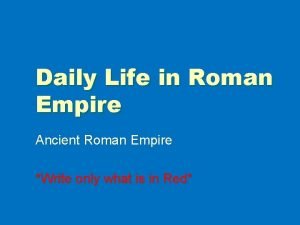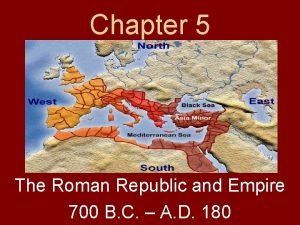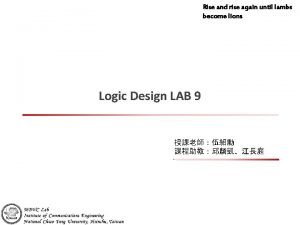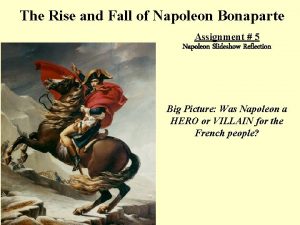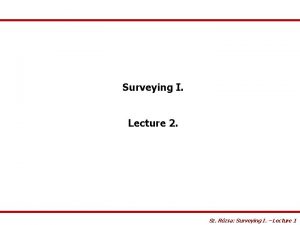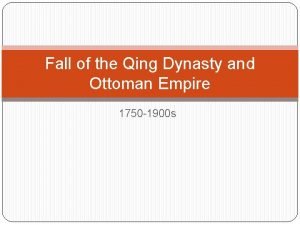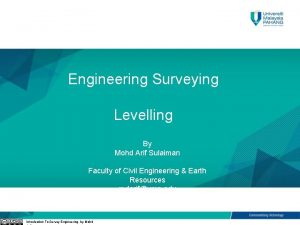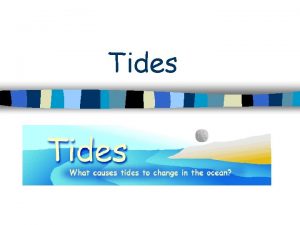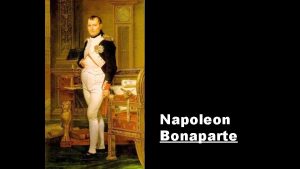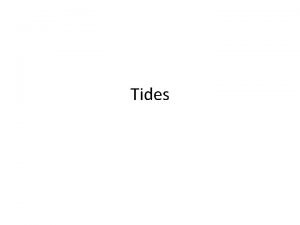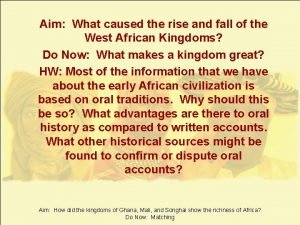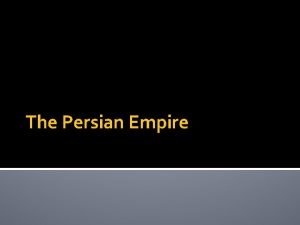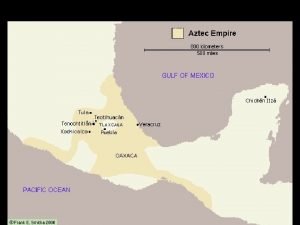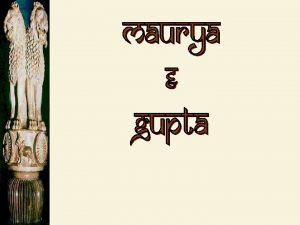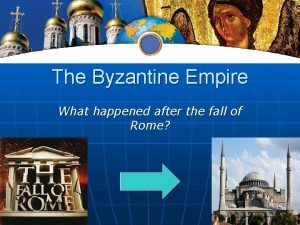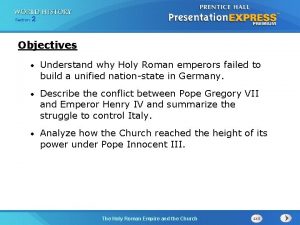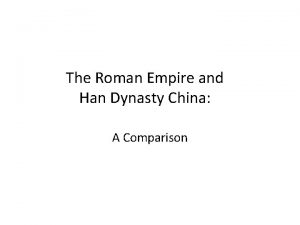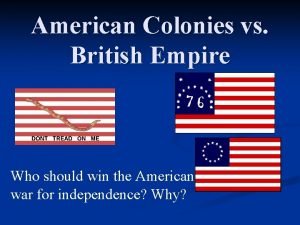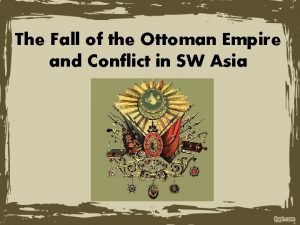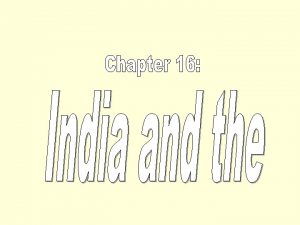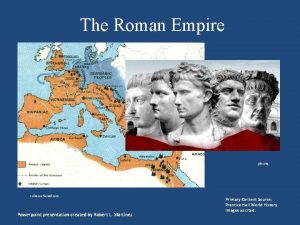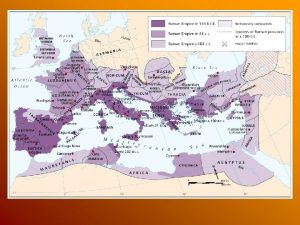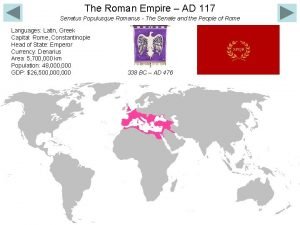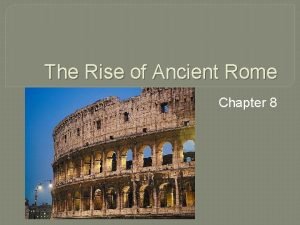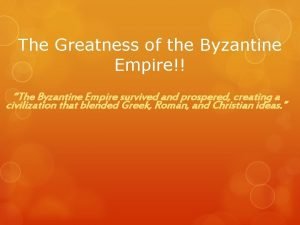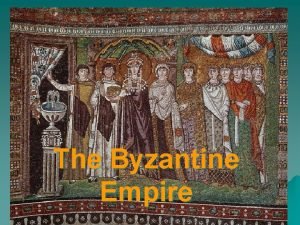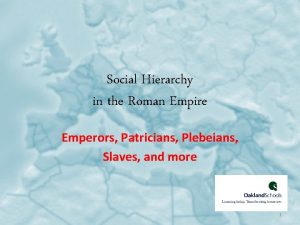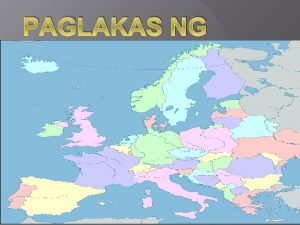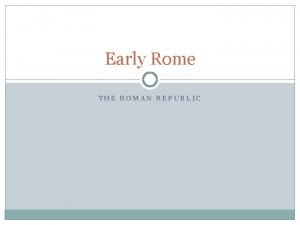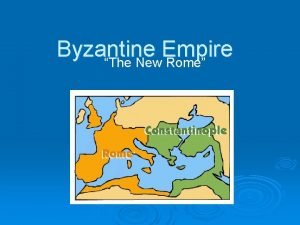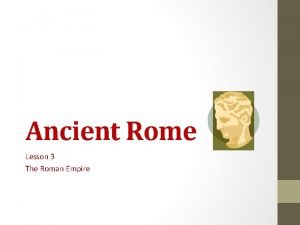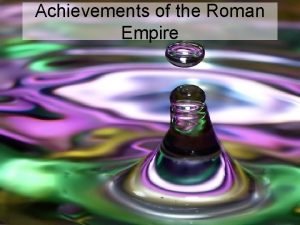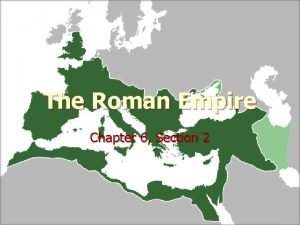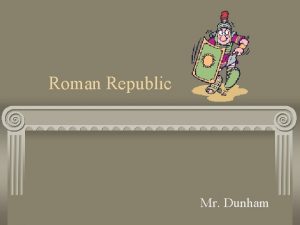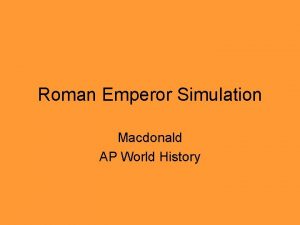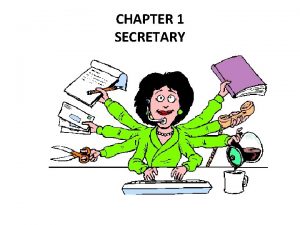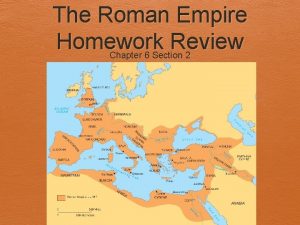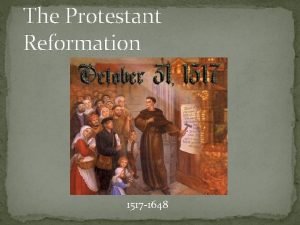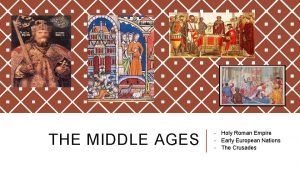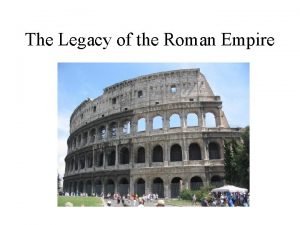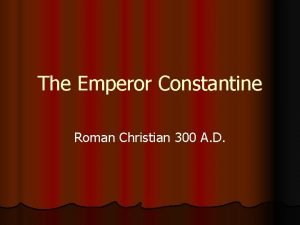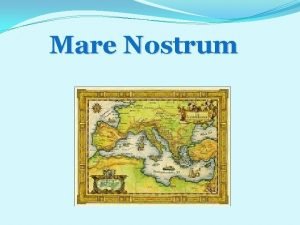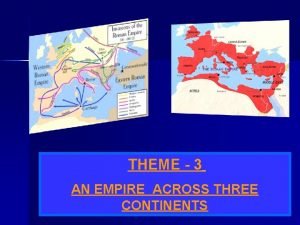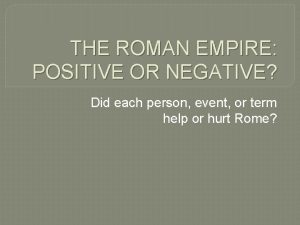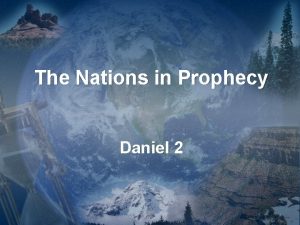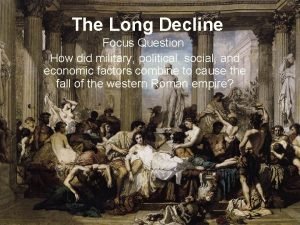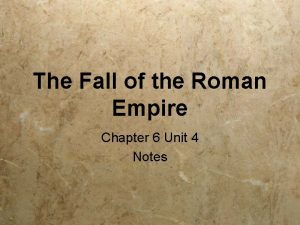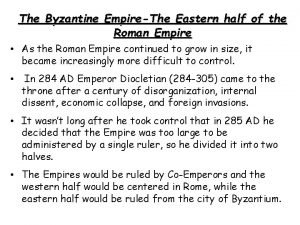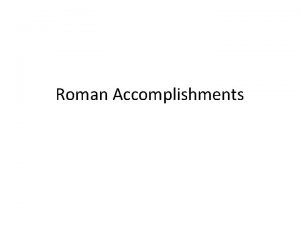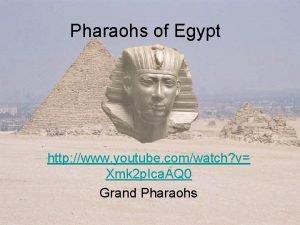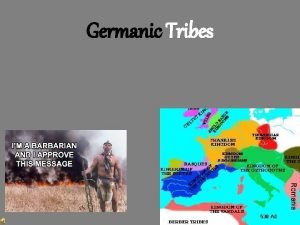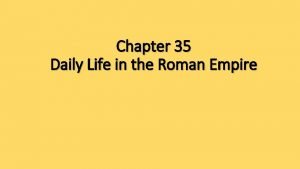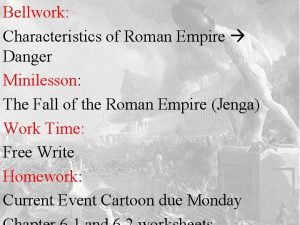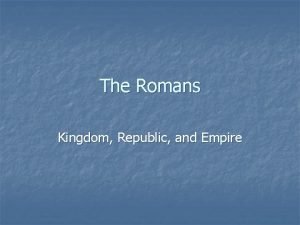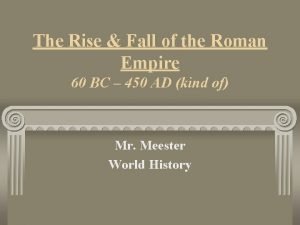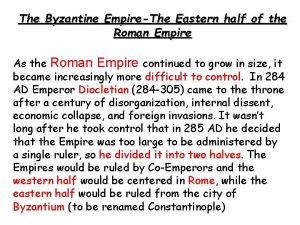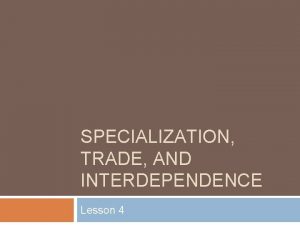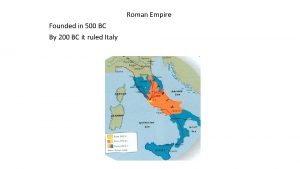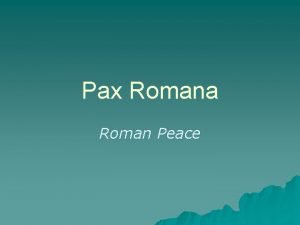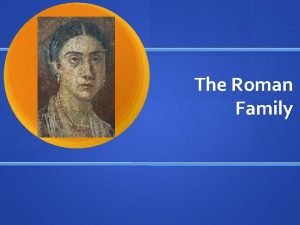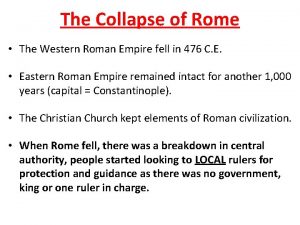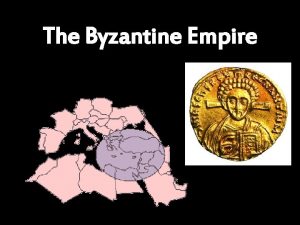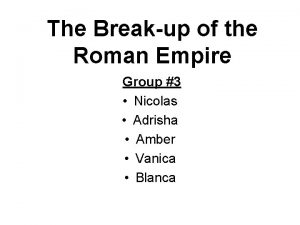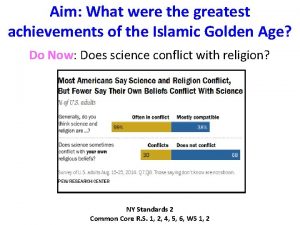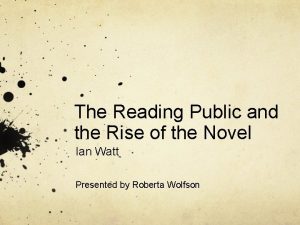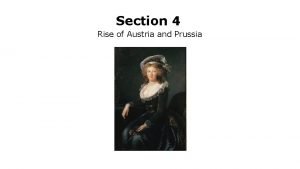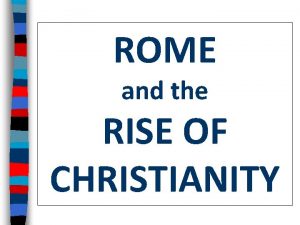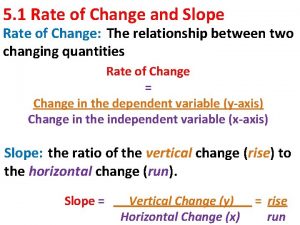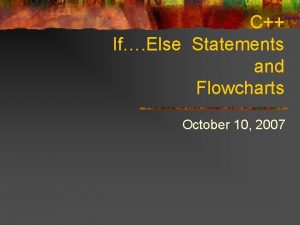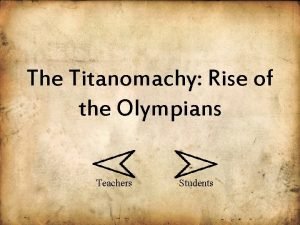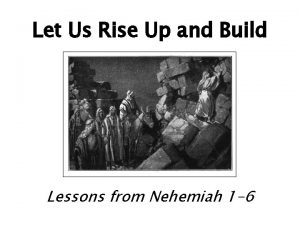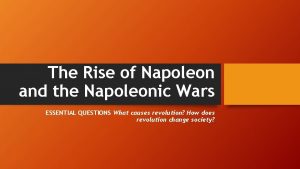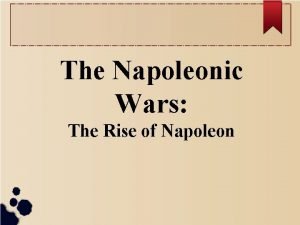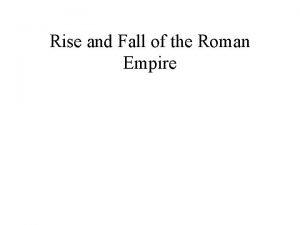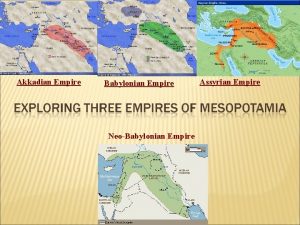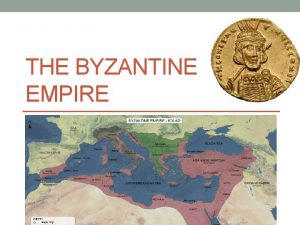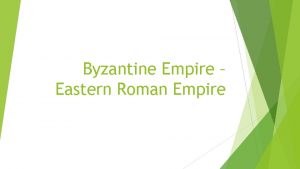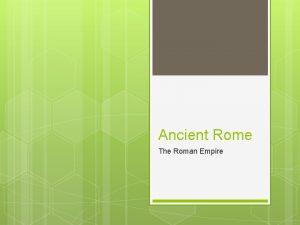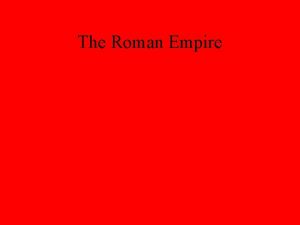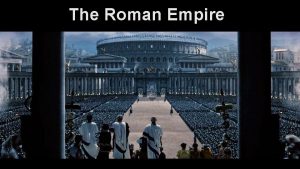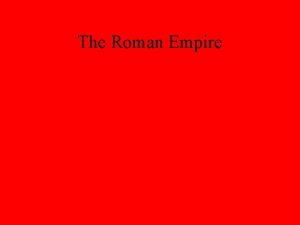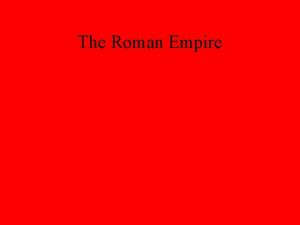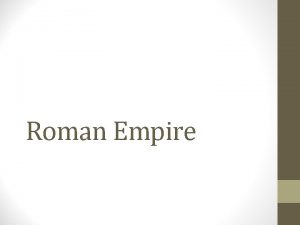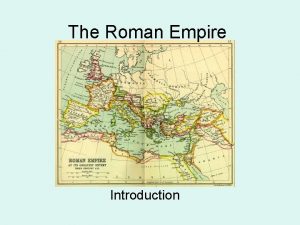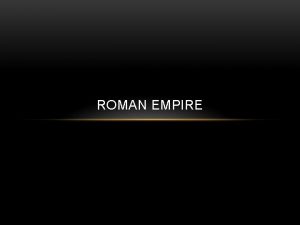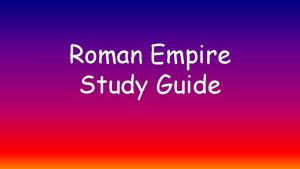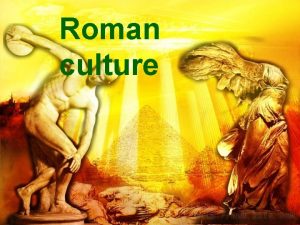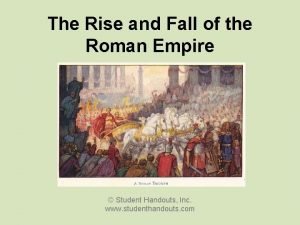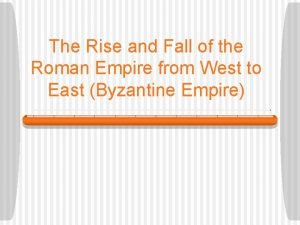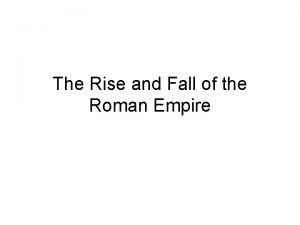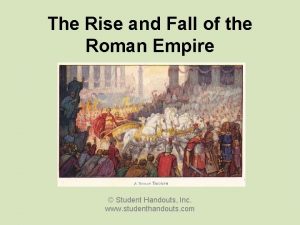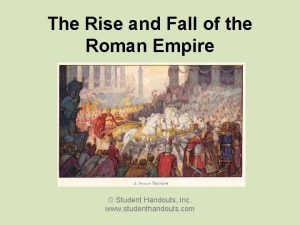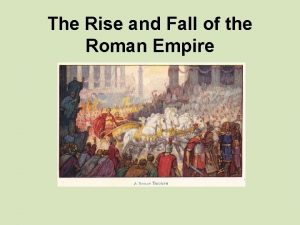The Rise and Fall of the Roman Empire








































































































- Slides: 104

The Rise and Fall of the Roman Empire

The Pre-Roman World


Roman Civilization Develops “All roads lead to Rome. ” “Rome was not built in a day. ” “When in Rome. . . ” How did Rome win such a place in modern popular culture? Italy’s Geography • Peninsula logical place for emergence of mighty empire – Juts south from Europe far into Mediterranean Sea – Lies almost halfway between eastern, western boundaries of the sea – Protected by mountains, sea – Rich soil, mild climate The Founding of Rome • Legend: Romulus and Remus, twin brothers raised by she-wolf; founded city 753 BC • Members of Indo-European tribe, Latins, reached Italy 1000 s BC; built Rome • City prospered partly from location on Tiber River • Valuable trade routes, easy access to sea

The Etruscans • Rome first ruled by Latin Kings • Came under Etruscan rule, 600 BC • Etruscans came from northern Italy – Evidence found at cemeteries indicates Etruscans great metalworkers, jewelers – Etruscan culture heavily influenced by Greeks • Etruscans had great influence on Roman society


Legendary Rome • Romulus founds Rome 753 BCE – A legend – Romulus probably named for Rome – “Rome” may come from a word for “river” • Seven Kings • Tarquinius Superbus deposed • Republic founded 509 BCE

Romulus and Remus

What was the Roman Empire? • There were two periods of Roman government. – Roman Republic • 509 BCE-30 BCE – Roman Empire • 30 BCE-476 CE • Rome technically had an “empire” under the Roman Republic. – But the term “Roman Empire” refers to the time period, beginning with Augustus, when Rome was ruled by emperors.

The Roman Republic

Rome Expands

Rome Becomes a Republic Etruscan Rule Ends • Etruscans ruled Rome until about 509 BC • Romans revolted, threw out last of kings, setup new type of government • Republic—elected officials governed state Patricians • In early days, heads of a few aristocratic families, patricians, elected officials • Patrician families controlled all society—politics, religion, economics, military • Maintained power through patronage system Plebeians • From beginning, common people, plebeians, challenged patricians for power • Invaders threatened 494 BC; plebeians refused to fight until changes made • Patricians knew they would have no army, expanded plebeian rights

Roman Republic (509 -27 BCE) • People elect representatives • Senate – Roman representative body – Made laws • Only citizens get vote! 13


Law & Citizenship • 12 Tables – Roman Law Code – Equal treatment under law (male citizens) – Innocent until proven guilty • Rights & Responsibilities of Citizenship 15

Plebeian Council • After receiving new rights, plebeians formed own assembly, Plebeian Council, to oversee affairs and protect interests • Gained right to elect officials known as tribunes • Tribunes’ job—protect against unjust treatment by patrician officials • Gained right to veto—ban laws that seemed harmful, unjust Laws • 450 BC, plebeians forced patricians to have all laws written down • Laws displayed in Roman Forum, central square, on 12 large bronze tablets • Because laws were posted, patrician judges could not make decisions based on own opinions or secret laws • One new law banned marriage between patricians and plebeians

Republican Government New Offices and Institutions • Patricians, plebeians worked out practical constitution • Created new offices of government • Consisted of three parts: Senate, popular assemblies, magistrates • Initially dominated by patricians; all state offices later open to both patricians, plebeians Elements of Government • Senate: 300 members, advised elected officials, controlled public finances, handled all foreign relations • Popular assemblies: in these all citizens voted on laws, elected officials • Magistrates: governed in name of Senate and people, put laws into practice, acted as priests

Governing Details Consuls Censors • When last king thrown out, his place taken by two magistrates called consuls • Next most important after consuls • Elected for one year; chief executives, army commanders • Filled vacancies in Senate Praetors • Recorded wealth, residence of population Constraints • Primarily judges, could act for consuls if consuls away at war • Government worked well because of system of checks, balances • After terms ended, given military commands, appointed provisional governors • Each part could impose certain constraints on others


Life in the Republic During the days of the Roman Republic, Rome was a thriving and vibrant city. At its heart was the Forum, the public square and site of the most important government buildings and temples. Location • Nestled between two hills: Palatine, Capitoline • Palatine, where wealthy lived • Capitoline, where grandest temples were Political Center • City leaders often found in Forum mingling with common people • Senate met in Forum • Key public addresses made there Busy Place • Forum more than just political center • Popular place for shopping, gossip • Busy shops lined either side of Forum • Public celebrations usually held there

Agrarian Roots • Despite bustling nature of city, Romans prided themselves on connection with soil • Farming, landownership the noblest ways to make money • Senators forbidden to participate in any career that did not involve land, could not engage in commerce Legend of Early Republic • Roman tie to land illustrated in legend of early Republic • Romans turned to greatest general, Cincinnatus, to save them from invasion • Cincinnatus plowing fields at the time Return to Farm • People made Cincinnatus dictator • Office of dictator had nearly unlimited power but could be held for only six months • Cincinnatus defeated enemies and returned to farm • Had no interest in retaining power

Social Structure • Patricians – Roman Aristocracy – Originally the whole Senate • Plebeians – Roman Commoner – Right to vote, begin gaining gov’t positions 22

Family Patriarchal Structure Education and Religion • Head of family—paterfamilias, family father—oldest living male • Had extensive powers over other members of family • Within family structure, virtues of simplicity, religious devotion, obedience emphasized • Adoption important in Roman society, a way to ensure family name would be carried on • Women could do little without intervention of male guardian, more freedom in lower classes • Upper class Romans placed great value on education • Parents taught children at home; wealthy families hired tutors or sent sons to exclusive schools to learn Latin, Greek, law, math, public speaking • Romans adopted much from Greek mythology, also from Egyptians, others • Each family worshipped local household gods, penates • Many worshipped emperor

Social Structure • Women – Had no rights legally equal to minor – Practically often have power within home as wives & mothers • Paterfamilias – male head of household, complete control – Legal & practical role as leader 24

Practical Knowledge • Romans practical, tried to apply knowledge gained from science to planning cities, building water, sewage systems, improving farming • Roman engineers constructed roads, bridges, amphitheaters, public buildings, aqueducts to bring water to cities • Without aqueducts, cities would not have grown as large Concrete • Romans developed concrete, with which they built amazing structures that still stand today • Roman bridges still span French, German, Spanish rivers • Roads that connected Rome with provinces still survive today • Added urban plan to every city they conquered; many still seen today

The Punic Wars Violence between Rome and Carthage broke out in 264 BC. Because the First Punic War was fought mostly at sea, Carthage’s powerful navy dominated the early fighting. Soon, however, the Romans built a navy of their own and were able to defeat Carthage. Hannibal • Violence soon broke out again • 218 BC, Carthaginian general Hannibal led army across Pyrenees, Alps to invade Italy • Hannibal ravaged Italy, defeated every army he faced • Romans needed new strategy Scipio • Romans decided to take war to Africa • General Publius Cornelius Scipio sailed to Africa, besieged Carthage • Forced Hannibal to sail home • Scipio defeated Hannibal, took Carthage, won Second Punic War The Romans had defeated Carthage, but it did not destroy the city as many citizens had wanted.

War With Carthage • 264 -241 BCE: Rome wins control of Sicily • 238 BCE Rome takes advantage of revolt in Carthage to seize Sardinia • 218 -201 BCE: Hannibal invades Italy, but Carthage loses Spain and N. Africa to Rome • 149 -146 BCE: Alarmed by Carthage’s recovery, Rome launches a final war to destroy Carthage

Carthage Falls Huge losses of Second Punic War remained in memories of many Romans • 149 BC Rome decided to destroy old enemy once and for all – Declared war on Carthage for third time – After siege of three years, Carthage fell – Romans enslaved entire population, completely destroyed city – They banned any people from living there

Rome Expands After Carthage

Many-Front War

The Conquest of Greece • Punic Wars raged in western republic; Rome involved in politics of eastern Mediterranean • Hellenistic kingdoms of Macedonia, Persia, and Egypt fought constantly; Greek city-states feared being conquered • City-states sought alliance with Rome Macedonia, Persia • Romans, Greek allies fought, and defeated Macedonia, Persia • Both became Roman provinces • Eventually Romans annexed Greece as province as well • Romans adopted many elements of Greek culture, particularly art Greek Culture • Romans also borrowed ideas of religion from Greeks, adopted their gods but changed the names • Not all Romans happy with growing Greek influence, thought Rome should remain purely Roman • Influence continued for many years

Problems in the Late Republic By the mid-100 s BC, Rome had no rival anywhere in the Mediterranean world. However, the responsibilities of running their vast holdings stretched the Roman political system to its limits. Social Unrest • Revolution began in political, social institutions • Tensions grew between classes of Roman society • Gracchi brothers tried to resolve tension Soldier-Farmers • Tribune Tiberius Gracchus noted mistreatment of soldier-farmers • Many reduced to poverty • Tiberius, brother Gaius tried to help soldiers Public Land • Gracchi tried to redistribute public land to farmers • Had public support, but Senate feared Gracchi trying to reduce its power • Senate urged mobs to kill brothers

The Republic Crumbles • Tiberius and Gaius Gracchus try but fail to implement social reforms (land reform)130122 BCE • Social War 91– 88 BCE: Rest of Italy tries to secede from Rome • Civil War 87 -81 BCE, followed by purge by Lucius Sulla • Catilina 63 -62 BCE: Failed coup • First Triumvirate 60 -53 BCE: Caesar, Pompey, Crassus

End of the Republic Most Common • When did it end? – 49 BCE General Julius Caesar “Crosses the Rubicon” for armed march into Rome – 44 BCE Julius elected “dictator for life” • Assassinated month+ later – 31 BCE Battle of Actium Octavius’ victory in Civil War over Marc Antony & Cleopatra – 27 BCE Senate naming Octavius emperor & becoming Augustus 34

Julius Caesar • Born 100 BCE • Consul 60 BCE • First Triumvirate 60 -53 BCE: Caesar, Pompey, Crassus • Conquest of Gaul 58 -49 BCE • Attempted invasion of Britain 55 BCE • 50 BCE: Caesar-Pompey alliance breaks up • 50 -45 BCE: Civil War; Caesar wins • 44 BCE: Assassinated

The Roman Empire

Rome Becomes an Empire Sulla paved the way for major changes in Rome’s government. The end of the Republic resulted from the ambitions of a few individuals. The First Triumvirate • Julius Caesar, Gnaeus Pompey, Licinius Crassus helped bring end to Republic End of Triumvirate • Crassus died; Pompey, Caesar fought civil war • Caesar, Pompey successful military commanders • Caesar defeated Pompey, took full control of Rome, became dictator for life, 44 BC • Crassus one of wealthiest people in Rome • Caesar brought many changes to Rome, popular reforms • 60 BC, the three took over Roman state, ruled as First Triumvirate • Senate feared he would destroy Roman Republic, murdered him, Ides of March

Rome Under Caesar

The Second Triumvirate • Caesar’s murder did not save the Republic • 43 BC, Second Triumvirate took power—Caesar’s adopted son, Octavian; loyal officer Marc Antony; high priest Lepidus • Lepidus pushed aside; Antony, Octavian agreed to govern half the empire each, Octavian in west, Antony in East Civil War • Civil war between Octavian, Antony broke out • Octavian defeated Antony and his ally, Egypt’s Queen Cleopatra • Cleopatra, Antony committed suicide; Octavian alone controlled Rome • Republic effectively dead; new period in Roman history beginning

Life in Imperial Rome Images of Rome from movies and stories: Gladiators in combat, temples of marble, soldiers marching to war. What was life really like? Life for the Rich Public Life • Pax Romana provided prosperity for many • Public officials not paid; only wealthy could afford to hold office • Rich citizens • Roman politicians worked to perfect public-speaking skills – Had both city, country homes – Homes had conveniences like running water, baths • Wealthy men spent much time in politics • Ties of marriage, friendship, family alliances as important as common interests for public officials, political groups

Life for the Poor • Nearly 1 million Romans lived in crowded three- or four-story apartment buildings • Fire a constant threat – Torches used for light – Charcoal used for cooking • To keep poor from rebelling – Free food, public entertainment offered – Two things interested public—bread, circuses

Public Entertainments • Romans of all classes enjoyed circus, chariot races • Held in Circus Maximus—racetrack could hold 250, 000 spectators • Also liked theater, mimes, jugglers, dancers, acrobats, clowns Bloody Spectacles • Romans enjoyed spectacles in amphitheaters • Wild animals battled each other and professional fighters • Gladiator contests most popular, performed in Colosseum for 50, 000 people Public Baths • Popular places for entertainment • Romans well aware of importance of bathing, hygiene for health • Many public baths had steam rooms, meeting rooms, and pools for socializing

Octavian Becomes Augustus • Octavian becomes Caesar after Julius is assassinated. • Octavian was sole ruler of Rome after his forces defeated Antony and Cleopatra at the Battle of Actium • The Senate gave him the name “Augustus, ” meaning “most high” • 23 BCE – Octavian, now referred to as Augustus, was made consul for life by the Senate – Also made “Princeps, ” meaning “first citizen” • Origin of the word “prince” – Also made “Imperator, ” meaning “successful general” • Origin of the word “emperor” – Also made “Pontifex Maximus, ” or “chief religious leader • Origin of the word “pontiff” (used to describe the pope today) – Also made a tribune – He had the power to call the Senate, veto the Senate’s laws, and make laws himself

Primus inter pares • “First among equals” • Augustus and later emperors tried to maintain the façade that they were elected officials rather than dictators • Being “first among equals” gave the illusion that an emperor was the most prestigious and important member of the Roman Senate, but that each senator was simultaneously equally important • In reality, the Roman emperors ruled with little input from anyone else

Rome Expands

Rome Expands

Rome Expands

The Augustan Age New Imperial Government • Augustus head of state more than 40 years, made smooth transition to new imperial government with power divided between him and Senate • Most financial, administrative matters under Augustus’s control Foreign Affairs • Started program to bring peace to west, particularly to Gaul, Spain • Began series of conquests that pushed border eastward to Danube River • Also took special care of Rome itself Legacy • Created police force, fire brigades; stockpiled food, water • Began building program; presided over moral, religious reforms • Great period of cultural creativity; great writers like Horace, Ovid, Virgil

Rome under Augustus: A Golden Age Attempted to reform public morals by promoting family life (largely unsuccessful). Began the practice of declaring emperors gods, and of picking their own successors. (He called Haley’s Comet the spirit of Caesar. ) Built and maintained the empire’s infrastructure (e. g. , roads). Encouraged the growth of business. Established fire and police departments for Rome. Established a strong money system. Said he “found Rome a city of bricks and left it a city of marble. ” Jesus, the founder of Christianity, was born in the Roman province of Judea during the reign of Augustus. Extended citizenship to more and more provincials.


All Roads Lead to Rome…

Roman Emperors after Augustus • Great variety in the quality of those emperors who succeeded Augustus • The office of emperor was initially designed to be hereditary – But from the start, there was confusion as to which family member would inherit the throne – Some emperors proved to be cutthroats, or insane, or both – The military came to play an enormous role in selecting who would become emperor

The Empire at its Peak • Flavian Dynasty – Vespasian (69– 79) – Titus (79– 81) – Domitian (81– 96) • Five Good Emperors – Nerva (96 -98) – Trajan (98 -117) – Hadrian (117 -138) – Antoninus Pius (138 -161) – Marcus Aurelius (161 -180)

Julio-Claudians and Flavians • • • Augustus died AD 14, empire ruled by Caesar’s relatives for 54 years Julio-Claudian Emperors’ abilities varied widely Tiberius a good soldier, competent administrator Caligula, brutal, mentally unstable; appointed favorite horse as consul AD 68, last of Julio-Claudians, Nero committed suicide Flavians • Following Nero’s death, civil wars raged in Rome • Four military leaders claimed throne in turn • Last, Vespasian reestablished order, as did reigns of two sons • Stability returned under Flavians The Good Emperors • AD 96, new line of emperors established—Good Emperors • Five rulers governed Rome for almost a century • From provinces different than Rome, continued opening Roman imperial society

Tiberius (14 -37 CE) • Stepson of Augustus • Abolished the Assembly • Capable general who extended the frontier in the north • Strengthened the empire • Appeared to dislike ruling, and gradually retired to the island of Capri

Caligula (37 CE-41 CE) • Son of famed military leader Germanicus, the nephew and adopted son of Tiberius • Earned his name “Caligula, ” meaning “little boots, ” by the Roman army as a child (he was dressed like a soldier) • Two years of good, effective rule, interrupted by a severe illness, and followed by two years of horrible rule • Members of family and perceived enemies – Exiled some, killed some, and forced others to commit suicide • Assassinated in 41 CE by members of the Praetorian Guard

Claudius (41 -54 CE) • Brought southern Britannia (what later became Great Britain) under Roman control, as well as several kingdoms in the East • Opened the Senate up to provincials • Became emperor because he was the last adult male of his family (brother of Germanicus and uncle of Caligula) • Conducted a census of the empire in 48 CE – 5, 984, 072 Roman citizens

Nero (54 -68 CE) • Considered a tyrant • Came to power after his mother allegedly poisoned his predecessor, Claudius • Murdered his mother, his stepbrother, and two of his wives • Also killed his teacher, the famous philosopher Seneca • Fire in Rome (64 CE) – Nero was accused of setting the fire, and of fiddling while the city burned – Nero blamed the fire on the new religious group known as “Christians” • Forced to commit suicide


Year of the Four Emperors (69 CE) • Brief period of civil war after the death of Emperor Nero • Four emperors ruled in quick succession – Galba – Otho – Vitellius – Vespasian • Illustrated the problems of imperial succession

Vespasian (69 -79 CE) • Built the Colosseum in Rome – Place where gladiatorial combats were held • First Jewish Revolt (66 -70 CE) – Destruction of the Temple in Jerusalem, in the Roman province of Judea – Carried out by Vespasian’s son, Titus – This was the Second Temple (516 BCE-70 CE) • First Temple (built by King Solomon ca. 960 BCE) had been destroyed in 586 BCE when the Babylonians conquered the Jews and embarked on what became known as the Babylonian Captivity • Succeeded by son Titus, then son Domitian


Trajan (98 -117 CE) • Born into a non-patrician family in what is now Spain • Massive public works program in Rome – Trajan’s Column, Trajan’s Forum, Trajan’s Market • Oversaw the expansion of the empire to its greatest extent • Considered to have been a great emperor


The Good Emperors Empire grew tremendously under Good Emperors • Added what are now Romania, Armenia, Mesopotamia, and the Sinai Peninsula • Successor Hadrian thought empire too large – Withdrew from almost all eastern additions – Built defensive fortifications to guard against invasions – Built wall 73 miles long in northern Britain

Hadrian (117 -138 CE) • Strengthened the empire’s defenses – Hadrian’s Wall separated Roman territory in Britannia from the Picts (in what is roughly now Scotland) • Under Hadrian, the Romans put down the Second Jewish Revolt (Bar Kokhba Revolt), 132 -136 CE – Also known as the Second Jewish-Roman War – Led by Simon Bar Kokhba, a many believed to be the messiah – Jews forced to leave Jerusalem after defeat • Many historians date this as the official start of the Jewish Diaspora

Pax Romana – Roman Peace • Rome controlled the entire Mediterranean region and beyond – Complete control = almost no warfare • This peace lasted nearly 200 years • More and more provincials were granted official Roman citizenship • Big jump in trade, arts, architecture, engineering, etc.

The Pax Romana The period from the beginning of August’s reign in 27 BC until the death of the last of the Good Emperors in AD 180 is often called the Pax Romana—the Roman Peace. This era was characterized by stable government, a strong legal system, widespread trade, and peace. Government • Roman government strongest unifying force in empire • Maintained order, enforced laws, defended frontiers • Aristocracy participated, but emperors made all important decisions Provinces • Empire divided into provinces ruled by governors appointed from Rome • Provincial government fair, efficient • Government in Rome kept close check on governors • Any citizen could appeal unfair treatment directly to emperor Empire brought uniformity to the cities of the Mediterranean world, which were governed in imitation of Rome.

The Beginnings of the End: The Fall of Rome

Marcus Aurelius (161 -180 CE) • Stoic philosopher – Wrote book Meditations • Succeeded by his son, Commodus (180192 CE) – The characters in the Russell Crowe film “Gladiator” are very loosely based on Marcus Aurelius and Commodus • The end of the reign of Marcus Aurelius was the end of the Pax Romana (27 BCE-180 CE)

Diocletian (284 -305 CE) • Rome had a century of chaos following the death of Marcus Aurelius – The “Crisis of the Third Century” – Diocletian was the first emperor in 100 years to properly restore order and end the violence • Absolute ruler who ended all personal liberties • Administration – Increased the bureaucracy for more effective administration – Divided the empire into two administrative realms (east and west) in 285 CE • This was the first step in the creation of what would become two separate empires – Roman (Western) Empire – Byzantine (Eastern) Empire

Attempts at Reform The crises of the 200 s shattered the Roman world. Drastic reforms had to be made if the empire were to survive. Two capable emperors rose to power and gave the empire another two centuries of life. Diocletian • Diocletian took power, 284 • Changed empire into absolute monarchy • Placed self above subjects, ruled with no accountability to anyone Divided Empire • Divided empire in two to improve efficiency • Ruled eastern half himself, appointed co-emperor to rule western provinces • Caesars helped run empire Rigid Order • Forced society into rigid order • Sons to follow trades, social positions of fathers • Peasants tied to land they farmed • Increased army, full attention to defense

Economic Reforms Imperial economy came under state direction with Diocletian • Commercial, manufacturing activities geared toward needs of imperial defense – New tax system raised more money for government, army – Reforms drastic, successful • Saved empire from immediate economic collapse

Constantine (312 -337 CE) • Moved the capital from Rome to Byzantium – Renamed the city Constantinople • Today the city is Istanbul (in modern Turkey) • Constantine and Christianity – His mother, Helena, had converted to Christianity – Edict of Milan (313 CE) • Christianity legalized (religious toleration) – Converted to Christianity on his deathbed

Justinian (527 -565 CE) • Powerful emperor of the Eastern (Byzantine) empire headquartered at Constantinople – Married Theodora, an intelligent courtesan • Managed to reunite the Eastern and Western empires for a time, but this did not last • Rewrote Roman law (Corpus Juris Civilis, or the Justinian Code) – Still the basis for civil law in several countries • Plague of Justinian (541 -542 CE) – Bubonic plague severely hurt the Byzantine empire – Emperor Justinian became sick, but recovered – Recovery for the Byzantine empire took hundreds of years

Review Questions 1. What event marked the end of the Roman Republic? 2. Explain the meaning of the Latin phrase primus inter pares. 3. Describe the accomplishments of Augustus. 4. What was the Pax Romana? 5. How do Caligula and Nero represent the problems of hereditary succession? 6. Describe the First and Second Jewish Revolts, including their causes and effects.

The Two Empires • Emperor Diocletian had believed that dividing the empire for administrative purposes would strengthen the empire – He was wrong – Once Constantine set up Constantinople as a capital city, the east/west split deepened • Western (Roman) Empire – Ended officially in 476 CE when the last emperor, Romulus Augustus, was deposed by a barbarian, Odoacer • Eastern (Byzantine) Empire – Lasted until 1453 when the empire was conquered by the Ottoman Turks

Roman Empire Splits, 395 A. D.

Why did Rome fall? Economic Reasons • Gap between rich and poor • Impoverished workers became tied to the land as coloni (sold as the land was sold) • As fewer members of the lower classes could afford to buy goods (no purchasing power), manufacturing and trade declined • Large estates became selfsufficient, further hurting manufacturing and trade Military Reasons • Roman Republic • Armies were servants of Rome • Roman Empire • Armies made and unmade emperors • Reliance on barbarian troops • Not ultimately loyal to Rome • Could not be counted on to fight their fellow barbarians • Interested in obtaining booty, not defending Rome or furthering Rome’s interests

Why did Rome fall? Political Reasons • Decline in patriotism • Democracy did not exist in reality • Citizens lost their tie (voting rights) to the state • Patriotism became based on loyalty to an emperor, not to Rome • Most emperors did not inspire respect or loyalty • East/West split • Two empires created problems regarding loyalty • No orderly succession • Murders, forced suicides, and civil wars frequently accompanied the transition from one emperor to the next Social Reasons • Population decline • Hunger • Plagues • War • Decline in intellectual culture • People did not dedicate themselves to public service and intellectual pursuits • People instead spent their leisure time watching chariot races and gladiatorial contests • Religious divisions • Eastern and Egyptian cults took away the popularity and status of traditional Roman religion • New faiths like Christianity directly questioned and challenged concepts such as imperial divinity

Fall of Rome • Problems: – So big, it was hard (& expensive) to govern – Series of poor & corrupt rulers – Civil Wars – Increased dependence on slavery – Wealth gap: poor overtaxed – Disease – EXTERNAL “Barbarian” Invaders: Goths, Huns, Vandals, Franks, Saxons 81


The Empire Weakens The Roman army’s inability to stop the Huns was one symptom of the weakness that befell the empire after the end of the Pax Romana. Weak Leaders • After 180, empire confronted by challenges from outside, growing problems within Military Dictatorship • Emperors increased size of Rome’s army • When last of Good Emperors died, Rome had no strong leader • Demands on financial resources, military caused economic crisis • Civil wars broke out • Empire: military dictatorship • Rome under increasing threat of invasions on eastern, western frontiers • Legions deposed emperors, elevated own leaders to throne • Twenty emperors in 49 years; all but one died violently

Invasion and Fall Unfortunately, the reforms of Diocletian and Constantine did not solve the overwhelming problems of the empire. During the 300 s and 400 s, these problems were only worsened by tribal peoples’ increasing pressures on the empire’s frontier. The Invaders Huns • Germanic tribes lived along, raided Rome’s frontiers for centuries • New peoples moved west from Central Asia, pushed Germanic tribes into empire • Rulers in Rome, Constantinople tried to hold empire together • Late 300 s, Huns stormed out of east and sent Germanic tribes fleeing • Imperial defenses in east held, but those in west overwhelmed • Huns formed vast empire among nomadic steppe peoples of Eurasia About 370 Huns attacked the Ostrogoths, a Germanic people living north of the Black Sea.

Migrating Tribes Goths • Assault on Ostrogoths frightened kinsmen, Visigoths • Visigoths fled into Roman Empire, Italy • Visigoths captured and sacked Rome itself, 410 Vandals • Other migrating tribes soon attacked Roman Empire • Infamous for destroying everything in path; Vandals attacked Rome in 450 s • Term vandal came to mean “one who causes senseless destruction” Attila • Leader of Huns, led attack on Gaul • Roman army allied with Visigoths, defeated Huns, 451 • Attila next turned on Rome; but Pope Leo I persuaded him to leave Italy


Fall of the Western Empire • Despite Huns’ withdrawal, Western Empire in shambles • Germanic tribes ruled most of western provinces, including Italy • Ostrogoths overthrew last emperor • Many historians consider this the end of the Western Roman Empire Eastern Empire • Despite western collapse, Eastern Empire endured for several centuries • People of Eastern Empire always thought of selves as Romans • Over time other influences, especially Greek, crept into culture • As a result of these influences, historians refer to the later period of the Eastern Empire by a new name, the Byzantine Empire.

Why is ancient Rome so important to world history? • • • Administration of a vast empire Christianity Architecture The Romans did not necessarily create and invent everything that Engineering they are commonly given credit for. Historians What the Romans were best at was taking something (like the Etruscan Jewish Diaspora arch), adapting it, and putting it to great use (such as in the Literature construction of aqueducts). Roman law Romance languages Transmission of Greek (Hellenistic) culture

Administration of a Vast Empire • Empire included over 100, 000 people of diverse backgrounds, cultures, and places – Rome learned to adapt its policies on a local level to fit the people of a given area – Citizenship gradually extended to all free men of the empire • Solid, strong bureaucracy that kept things running smoothly the majority of the time – Empire’s administration run by countless proconsuls, procurators, governors, and minor officials – Four prefectures, further divided into dioceses, then into provinces • Strong infrastructure – Facilitated movement by officials, soldiers, traders, travelers, etc.

Rome & Christianity • 312 CE Emperor Constantine converts • 380 CE Emperor Theodosius makes Christianity official imperial religion • Pentarchy – 5 jurisdictions of Catholic Church w/ patriarch (leader) – Rome, Constantinople, Antioch, Jerusalem, Alexandria 90

Christianity • Christianity started in the Roman province of Judea • Pax Romana and Roman infrastructure – Early Christians, as citizens of the Roman Empire, could travel freely throughout the empire – There was a significant number of Christians in Rome by 64 CE, the year Nero blamed them for the fire (ca. 30 years after Jesus died) – According to tradition, Paul of Tarsus (St. Paul) used his Roman citizenship to have his criminal trial relocated to Rome from Caesarea (in Judea-Palestine) in the 60 s CE • Christianity finally gained acceptance with the Edict of Milan (313 CE) and Constantine’s conversion – Future Roman emperors were Christians – As the Western Roman Empire fell apart, the city became the headquarters of the Roman Catholic Church • The Pope used the imperial title “Pontiff” • The Church ended up ruling the city of Rome and surrounding areas • Church used Roman administrative districts, such as dioceses, in its administration

Architecture & Engineering • A large part of Rome’s success was due to the importance Rome placed on building and maintaining the empire’s infrastructure – Aqueducts, bridges, dams, harbors, roads • Public buildings – Amphitheaters (e. g. , Colosseum), basilicas (oblong halls), government offices, palaces, public baths, theaters, etc. • Architecture – – Basic style was copied from the Greeks Arch copied from the Etruscans Dome Vault


Architecture and Language Locations Advances • Many examples still seen throughout southern Europe, northern Africa, Southwest Asia • Arch, vault allowed Romans to construct larger buildings than earlier societies • Dominant advances—round arch and the vault • Have been used for centuries, still seen in many countries Ruins Beyond Latin • Ruins of buildings inspired generations of architects • Romance languages developed from Latin • Michelangelo, Thomas Jefferson, others • Spanish, French, Italian, Portuguese, Romanian

Historians and Historical Writings • Julius Caesar (100 -44 BCE) – Commentaries on the Gallic Wars • Cicero (106 -43 BCE) – Letters and orations – Called the “Father of Latin prose” • Livy (59 BCE-17 CE) – Annals, history of Rome from beginnings to Augustus • Plutarch (46 -120 CE) – Parallel Lives, comparison of Greek and Roman heroes – Moralia, a collection of essays, etc. , on customs and mores • Tacitus (ca. 56 -ca. 117 CE) – Germania, about the Germanic tribes of Europe – Annals and Histories, about the emperors of his time

Literature • Playwrights – Plautus and Terence – Mostly a copy of the Greek style • But Greek plays were designed to instruct • Roman plays were designed merely to entertain • Poets – Virgil (70 -19 BCE) • Aeneid, epic poem based on Homer’s Iliad – Horace (58 -8 BCE) • Odes • Lyric poetry praising an idyllic, simple time in early Roman history

Jewish Diaspora • Judea-Palestina (roughly modern Palestine or Israel) was a Roman province • The Romans put down a series of uprisings • The future Emperor Titus destroyed the Second Temple of Jerusalem and carried its spoils to Rome (70 CE) • After the Bar Kokhba Revolt (132 -136 BCE), the Jews were forced to migrate from the area around Jerusalem – Jews were never again a large presence in Israel. Palestine until the 20 th century

Roman Religion • Polytheistic pantheon similar to Greek gods • Cities had patron gods & tied to civic rituals & ceremonies • Diverse empire and basically tolerant as long as does not interfere with civic/gov’t role 98

Roman Law • Started with the Twelve Tables (450 BCE) • Developed over a thousand years – Included decisions of judges, ideas of the Republic and Empire, and rulings of emperors – Public law • Relationship of citizen to state – Private (civil) law • Relationships between people – Peoples law (jus gentium) • Rights of foreigners • Justinian Code (6 th century CE) – Encapsulated the previous 1000+ years of Roman law – Still used as the basis of civil law in many parts of Europe

Romance Languages • “Romance” meaning “Roman” • Romance languages developed from Latin – – – French Italian Portuguese Romanian Spanish • English – Old English was a Germanic language – William the Conqueror, of Normandy (in France), brought French (a Romance language) to England in 1066 – Middle English (the forerunner of the English spoken today) is a mixture of these old Germanic and French languages – About half of modern English can be traced to Latin • Law, medicine, and science – Scientists have traditionally used Latin as a “universal language” – Our scientific names, and most legal and medical terminology, is Latin • Religion – The Catholic Church preserved the Latin language – Catholic masses were said in Latin until the 1960 s

Rome’s Cultural Legacy Although the Western Roman Empire fell in 476, much of Roman culture continued to influence life for centuries. In fact, we can still see many of the legacies of the great empire today. Science and Engineering • Romans less interested in original scientific research than in collecting and organizing information Galen • Physician, AD 100 s • Wrote volumes summarizing all medical knowledge of his day • Greatest authority in medicine for centuries Other Thinkers • Ptolemy stated knowledge of others as single theory in astronomy • Pliny the Elder wrote about Mount Vesuvius

Roman Science • The Romans were not great scientists like the Greeks had been – Little original thought • Pliny the Elder (23 -79 CE) – Natural History, a collection of all known botanical, geographical, medical, physiological, and zoological information available – But Pliny never verified his information • Galen (131 -201 CE) – Summarized all Greek medical knowledge – His work was almost the entire basis for anatomy and physiology studies for centuries to come • In science, as in all else, the Romans were practical – Public health and sanitation were important – Aqueducts brought fresh water and sewers took away dirty water – Hospitals served soldiers (triage), etc.

Transmission of Greek (Hellenistic) Culture • Preserved and transmitted Greek culture to the West • Greek texts, etc. , were popular in Rome • When Rome fell, the Catholic Church (monks) continued to preserve and transmit Greek texts and ideas

Review Questions 1. Who split the empire into two halves, and why? 2. Explain the relationship between Emperor Constantine and Christianity. 3. Describe the accomplishments of Emperor Justinian. 4. When did the Western (Roman) and Eastern (Byzantine) empires officially end, and why? 5. Explain the economic, military, political, and social reasons for the fall of the Western Roman Empire. 6. Name and describe at least three contributions of Roman civilization to world history.
 Tricky dick: the rise and fall and rise of richard m. nixon
Tricky dick: the rise and fall and rise of richard m. nixon Ancient rome: the rise and fall of an empire cast
Ancient rome: the rise and fall of an empire cast Rome rise and fall of an empire
Rome rise and fall of an empire Ghana empire dates
Ghana empire dates What factors led to the decline of the roman republic
What factors led to the decline of the roman republic Empire
Empire Life in the roman empire
Life in the roman empire Why did rome fall
Why did rome fall Roman republic vs roman empire
Roman republic vs roman empire Sheep become lions
Sheep become lions Raise and rise again until lambs become lions
Raise and rise again until lambs become lions A union b example
A union b example The periodic daily rise and fall of ocean water
The periodic daily rise and fall of ocean water Assignment
Assignment Rise and fall method surveying
Rise and fall method surveying China opium war political cartoon
China opium war political cartoon Leveling rise and fall method
Leveling rise and fall method Spring tide and neap tide
Spring tide and neap tide Rise of napoleon timeline
Rise of napoleon timeline The rise and fall of the voice in speaking
The rise and fall of the voice in speaking Relevance lost the rise and fall of management accounting
Relevance lost the rise and fall of management accounting The periodic daily rise and fall of ocean water
The periodic daily rise and fall of ocean water The rise and fall of adolf hitler
The rise and fall of adolf hitler Picture of ancient greece map
Picture of ancient greece map Mali rise and fall
Mali rise and fall Rise of the persian empire
Rise of the persian empire How did the aztec empire rise
How did the aztec empire rise Mauryan empire and gupta empire venn diagram
Mauryan empire and gupta empire venn diagram Rising and falling tones
Rising and falling tones Functions of phonetics
Functions of phonetics The rise fall andrew
The rise fall andrew What happened after rome fell
What happened after rome fell The holy roman empire and the church section 2
The holy roman empire and the church section 2 The holy roman empire and the church section 2
The holy roman empire and the church section 2 Han dynasty china and imperial rome
Han dynasty china and imperial rome American empire vs british empire
American empire vs british empire Ottoman empire 1914
Ottoman empire 1914 Fall of gupta empire
Fall of gupta empire Pbs roman empire
Pbs roman empire Roman empire under justinian
Roman empire under justinian Spanish empire
Spanish empire Rome chapter 8
Rome chapter 8 Byzantine empire 526 ce
Byzantine empire 526 ce Roman empire at its height
Roman empire at its height Roman empire under justinian
Roman empire under justinian Social structure of the holy roman empire
Social structure of the holy roman empire Paano lumakas ang europe
Paano lumakas ang europe Plebian
Plebian Why did the byzantine empire split
Why did the byzantine empire split Lesson 3 the early roman empire
Lesson 3 the early roman empire Roman empire achievements
Roman empire achievements The roman empire chapter 6 section 2
The roman empire chapter 6 section 2 Roman empire gif
Roman empire gif Roman emperor sinulator
Roman emperor sinulator Secretary meaning
Secretary meaning Golden age of the roman empire
Golden age of the roman empire Calvinism map
Calvinism map Holy roman empire def
Holy roman empire def What was the legacy of the roman empire
What was the legacy of the roman empire Emperor 300
Emperor 300 Dba fanaticus
Dba fanaticus Mare nostrum rome
Mare nostrum rome High empire art
High empire art Rome controlled territory on what three continents
Rome controlled territory on what three continents As a result of 207 years of pax romana, the roman empire
As a result of 207 years of pax romana, the roman empire Revived roman empire
Revived roman empire How did the hun invasion weaken the roman empire?
How did the hun invasion weaken the roman empire? 3.14 quiz: the roman empire crumbles
3.14 quiz: the roman empire crumbles Eastern half of the roman empire
Eastern half of the roman empire Roman achievements
Roman achievements Youtube egypt
Youtube egypt Pepin the hunchback
Pepin the hunchback Diocletian split roman empire
Diocletian split roman empire Daily life in the roman empire
Daily life in the roman empire Roman empire characteristics
Roman empire characteristics Kingdom republic empire
Kingdom republic empire Roman empire 60 bc
Roman empire 60 bc Eastern half of the roman empire
Eastern half of the roman empire What divided the byzantine empire
What divided the byzantine empire Roman empire specialization
Roman empire specialization Roman empire 500 bc
Roman empire 500 bc Roman empire
Roman empire Roman empire family life
Roman empire family life Manor roman empire
Manor roman empire Byzantine theatre
Byzantine theatre Break up of roman empire
Break up of roman empire Greatest achievement of the ottoman empire
Greatest achievement of the ottoman empire The reading public summary
The reading public summary Rise of austria and prussia
Rise of austria and prussia Othello synopsis
Othello synopsis Area of low pressure where air masses meet and rise
Area of low pressure where air masses meet and rise Rise and run
Rise and run Rome and the rise of christianity
Rome and the rise of christianity Rise and shine primary school
Rise and shine primary school Her children rise and call her blessed
Her children rise and call her blessed As of now
As of now Rise and run
Rise and run Rise and shine isaiah
Rise and shine isaiah Rise and shine algorithm
Rise and shine algorithm Protogenus
Protogenus Let us rise up and build
Let us rise up and build Let us rise up and build
Let us rise up and build The rise of napoleon and the napoleonic wars
The rise of napoleon and the napoleonic wars Artilarist
Artilarist Hát kết hợp bộ gõ cơ thể
Hát kết hợp bộ gõ cơ thể
